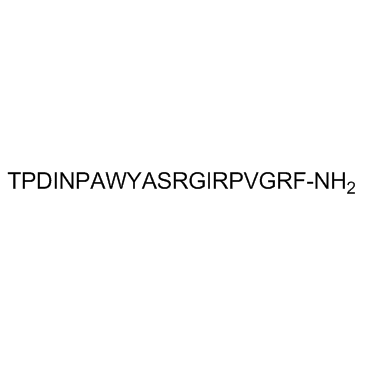Prolactin-Releasing Peptide (12-31) (human)
Modify Date: 2024-01-10 19:51:25

Prolactin-Releasing Peptide (12-31) (human) structure
|
Common Name | Prolactin-Releasing Peptide (12-31) (human) | ||
|---|---|---|---|---|
| CAS Number | 235433-36-0 | Molecular Weight | 2272.566 | |
| Density | 1.5±0.1 g/cm3 | Boiling Point | N/A | |
| Molecular Formula | C104H158N32O26 | Melting Point | N/A | |
| MSDS | N/A | Flash Point | N/A | |
Use of Prolactin-Releasing Peptide (12-31) (human)Prolactin Releasing Peptide (12-31), human is a fragment of the prolactin releasing peptide (PrRP). Prolactin Releasing Peptide (1-31), human is a high affinity GPR10 ligand that cause the release of the prolactin. |
| Name | SRTHRHSMEIRTPDINPAWYASRGIRPVGRF-NH2 |
|---|---|
| Synonym | More Synonyms |
| Description | Prolactin Releasing Peptide (12-31), human is a fragment of the prolactin releasing peptide (PrRP). Prolactin Releasing Peptide (1-31), human is a high affinity GPR10 ligand that cause the release of the prolactin. |
|---|---|
| Related Catalog | |
| Target |
GPR10[1] |
| In Vitro | The Prolactin Releasing Peptide (PrRP) is a C-terminally amidated, 31-amino acid peptide derived from a 98-amino acid precursor. Radioiodinated PrRP-(1-31) binds to its receptor with high affinity (1 nM) and stimulates calcium mobilization in CHOK1 cells stably transfected with the receptor. A series of N-terminal deletions reveals that the Prolactin Releasing Peptide (12-31) amino acid is equipotent to PrRP-(1-31). Further N-terminal deletions reduce the affinity of the ligand considerably[1]. Prolactin Releasing Peptide (PrRP) has been identified as a specific, high affinity endogenous ligand for GPR10. Prolactin Releasing Peptide (PrRP) preproprotein can be cleaved at two different positions to give rise to two forms of 31 or 20 amino acids; Prolactin Releasing Peptide (PrRP)-31 and Prolactin Releasing Peptide (PrRP)-20 respectively. Rat Prolactin Releasing Peptide (PrRP) has also been identified and occurs as 31 or 20 amino acid forms; these peptides are highly conserved between species. Human PrRP‐20, human PrRP‐31, rat PrRP‐20 and rat PrRP‐31 display high affinity for GPR10 receptors, with Ki values of 0.26±0.07, 1.03±0.41, 0.22±0.06 and 0.33±0.11 nM, respectively[2]. |
| In Vivo | Following intracerebroventricular injection of Prolactin Releasing Peptide (1-31), human 5 nM there is a highly significant simulation of plasma LH that began at 10 minutes and is maintained over the course of the experiment. Plasma FSH increased at 20 minutes following ICV injection. Total plasma testosterone increased at 60 minutes post injection[3]. |
| Animal Admin | Rats[3] Groups of rats are injected with either Prolactin Releasing Peptide (1-31) 5 nM or saline. Prolactin Releasing Peptide (1-31), human is dissolved in saline is administered in a total volume of 10 μL. Animals are habituated to the injection procedures by three ICV injections prior to the study to minimize stress in the animals. At 10, 20, 60 minutes following injection, rats are decapitated and trunk blood collected into plastic tubes[3]. |
| References |
| Density | 1.5±0.1 g/cm3 |
|---|---|
| Molecular Formula | C104H158N32O26 |
| Molecular Weight | 2272.566 |
| Exact Mass | 2271.202393 |
| LogP | -1.71 |
| Index of Refraction | 1.686 |
| L-Phenylalaninamide, L-threonyl-L-prolyl-L-α-aspartyl-L-isoleucyl-L-asparaginyl-L-prolyl-L-alanyl-L-tryptophyl-L-tyrosyl-L-alanyl-L-seryl-L-arginylglycyl-L-isoleucyl-L-arginyl-L-prolyl-L-valylglycyl-L-arginyl- |
| MFCD02094631 |
| L-Threonyl-L-prolyl-L-α-aspartyl-L-isoleucyl-L-asparaginyl-L-prolyl-L-alanyl-L-tryptophyl-L-tyrosyl-L-alanyl-L-seryl-L-arginylglycyl-L-isoleucyl-L-arginyl-L-prolyl-L-valylglycyl-L-arginyl-L-phenyl alaninamide |
| L-Threonyl-L-prolyl-L-α-aspartyl-L-isoleucyl-L-asparaginyl-L-prolyl-L-alanyl-L-tryptophyl-L-tyrosyl-L-alanyl-L-seryl-L-arginylglycyl-L-isoleucyl-L-arginyl-L-prolyl-L-valylglycyl-L-arginyl-L-phenylalaninamide |
| L-Phenylalaninamide, L-threonyl-L-prolyl-L-α-aspartyl-L-isoleucyl-L-asparaginyl-L-prolyl-L-alanyl-L-tryptophyl-L-tyrosyl-L-alanyl-L-seryl-L-arginylglycyl-L-isoleucyl-L-arginyl-L-prolyl-L-valylglyc yl-L-arginyl- |
| Prolactin Releasing Peptide (1-31), human |
| Prolactin Releasing Peptide (12-31), human |

